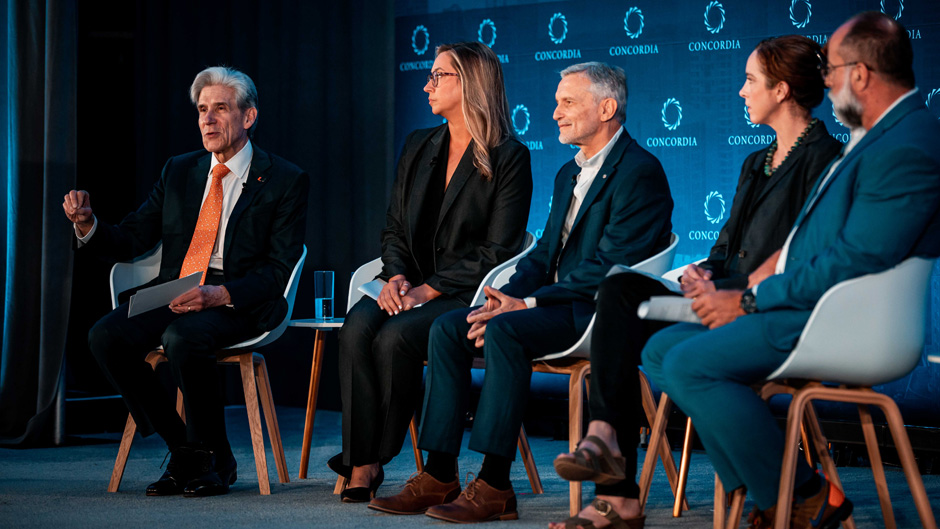Several former Latin American presidents, current legislators, U.S. officials, and leading private and public-sector innovators participated on Thursday in the first of two days of fast-paced panels on climate change, misinformation, immigration, digital innovation, health care equity, and psychedelic medicine, among others.
The 2023 Concordia Americas Summit’s regional gathering was hosted for the second consecutive year by the University of Miami, which this year also served as principal programming partner.
Matthew Swift, Concordia co-founder and CEO, noted the “confluence of concerns” that have emerged or worsened in recent years—chief among them the eroding trust in institutions—and highlighted the value of the in-person gathering geared to facilitate partnerships to resolve the challenges.
Julio Frenk, president of the University of Miami, public health expert, and former Mexican health minister, said that the conference’s three dimensions—social function as a convener, geographic focus on the Americas, and priority of topics—mirrored those of the University.
“Some of the topics being discussed here are absolutely crucial to our agenda of advanced education and research, democracy, and global threats,” said Frenk, adding that the erosion of trust—not only in institutions but also between people—was especially disturbing.
“The erosion of trust in each other and in the future—that’s the fundamental trust that we must rebuild,” said Frenk, while noting the University’s newly opened George P. Hanley Democracy Center and Climate Resilience Academy as initiatives toward that goal.
Laura Chinchilla, the former president of Costa Rica, moderated a morning panel on “Polycrisis: Latin America,” exploring the phenomenon where crises in different areas interact or overlap in creating a new form of challenge.
“It’s no longer viable to look at a crisis just within itself,” said Pedro Less, vice president of public policy in Latin America for Meta. “We’re very accustomed to polycrisis in Latin America; we have to see many crises evolving at the same time.”
Felicia Knaul, director of the Institute for Advanced Study of the Americas, moderated an afternoon session together with Erin Kobetz, professor of medicine and public health sciences and vice provost for research and scholarship, and Dr. Sophia George, associate professor of Obstetrics, Gynecology, and Reproductive Sciences at the Miller School of Medicine, that explored the disparities in access to breast and cervical cancers and other medical treatments that women throughout the Americas face based on race and economic status.
The three public health specialists discussed the role of community engagement and education to better reach at-risk populations.
“We can’t do research in communities that have been historically disregarded without inviting them to be part of the research,” Kobetz said. “As scientists we have an opportunity and obligation to bridge that gap and invite those voices to help conceptualize health care strategies and the inherent solutions that come with them.”
Alejandro Portes, research professor who teaches across the University’s School of Law and the College of Arts and Sciences Department of Sociology, shared his insights and research on Miami on the “Public Policy Perspectives: Sustainable Refugee Integration” panel.
The renowned sociologist cited Miami’s unique “historic receptivity and general attitude” toward immigrants, especially those from the Americas and Caribbean. He noted that the metropolitan area had accommodated 200,000 newcomers over the past year—a number that would have overwhelmed the existing services of most other cities.
“But the whole flow was entirely and invisibly absorbed by the local social capital network,” said Portes, referring to the support system of churches, organizations, and families that has welcomed waves of immigrants over the past decades.
Frenk moderated the session on “Climate Resilience’s ‘Ground Zero’: Miami Seas,” which featured University experts Rodolphe el-Khoury, dean of the School of Architecture; Katherine Mach, professor with the Department of Environmental Science and Policy at the Rosenstiel School of Marine, Atmospheric, and Earth Science; Antonio Nanni, inaugural senior scholar, professor, and chair at the College of Engineering; and Abigail Fleming, Mysun Foundation practitioner in residence at the School of Law’s Environmental Justice Clinic.
Frenk highlighted the recent establishment of the Climate Resilience Academy for its capacity to bridge the multitude of University initiatives relating to climate change, resilience, and sustainability.
el-Khoury highlighted the importance of this collaborative, interdisciplinary initiative.
“These big problems require innovative designing and new structures of support,” he said. “We have to build from the ground-up to create this functional unit. It’s all about partnerships.”
While celebrating the progress being made to address climate change, Fleming emphasized the importance of addressing the structural inequalities that continue to be exacerbated by the threat and its consequences.
“There is absolute urgency and so many ways to do this. But first of all, we have to acknowledge the history of disinvestment in different populations,” she said. “If we don’t, there’s the risk of the same exploitation of those same harms.
“What we can do in the academy is to model collaboration,” Fleming said. “There needs to be a power shift and new frameworks so that we can come together to really seek true systemic change.”

